Der Chor
Der Coro Ha-Kol (Die Stimme) wurde im Dezember 1993 auf Initiative einiger Sänger des Tempio Maggiore, der größten Synagoge Roms, sowie anderer Liebhaber der jüdischen Musiktradition gegründet. Es bestand die Notwendigkeit, ein Panorama und ein Zeugnis der Werke und jüdischen Chorkompositionen wiederzuentdecken und einem breiten Publikum, auch außerhalb der Synagoge, zugänglich zu machen, mit dem Ziel, das außergewöhnliche musikalische und religiöse Erbe der jüdischen Gemeinde Roms, einer der ältesten in Europa, zu erhalten und zu bewahren.
Coro Ha-Kol blickt auf fast 30 Jahre Konzerttätigkeit und Auftritte in Italien und im Ausland, wie in Israel, dem Vereinigten Königreich, Österreich, Deutschland, Russland und der Ukraine zurück. Im Laufe der Jahre wurde das Repertoire nach und nach mit Werken von Komponisten aus dem 16. bis 20. Jahrhundert bereichert, wobei auch Musik aus der sephardischen (spanisch-portugiesischen) und aschkenasischen (osteuropäischen) jüdischen Welt berücksichtigt wurde. In jüngster Zeit werden auch zeitgenössische Musikstücke berücksichtigt, nicht nur liturgische, sondern jene, inspiriert von Themen aus dem jüdischen Leben oder komponiert von jüdischen Musikern.
Es gibt zahlreiche Aktivitäten, Veranstaltungen und Konzerte, an denen der Coro Ha-Kol teilgenommen hat, immer bereit, sich mit anderen religiösen Überzeugungen auseinanderzusetzen und einen musikalischen Dialog zwischen den Kulturen zu pflegen. Das „Lied des Volkes“, die Lieder der Völker, die sich an Gott wenden, auch wenn sie nicht ausgesprochen religiös sind, vereinen Menschen unterschiedlichen Glaubens und unterschiedlicher Herkunft und sind eine Gelegenheit für Frieden und Eintracht
Der Coro Ha-Kol, der von Alberto de Sanctis geleitet und von Antonio Cama begleitet wird, besteht aus einer Laiengruppe, die sich aus vier Sopran-, Alt-, Tenor- und Bassstimmen zusammensetzt.
Der Direktor
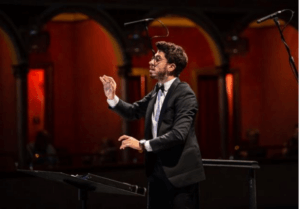
1989 geboren, studierte Alberto de Sanctis am Konservatorium „L.D’Annunzio“ in Pescara. Er hält einen Abschluss mit Auszeichnung in Chor- und Orchesterleitung. Er spezialisierte sich auf Kinder-Chormusik mit Kindern unter der Leitung von M° Josè Maria Sciutto, bei dem er sein Wissen zur Methode der Kinderchorpädagogik perfektionierte und den Begriff „Globale Methode“ prägte.
Von 2015-2019 unterrichtete Alberto de Sanctis Chorgesang in vorakademischen Kursen in Absprache mit dem Conservatorio Santa Cecilia in der Schule „Regina Margherita“ in Rom. Seit 2016 ist er Lehrer an der Chorgesangsschule des Teatro dell’Opera di Roma, wo er die Gelegenheit hatte, mit weltbekannten Dirigenten zusammenzuarbeiten, darunter Riccardo Muti, James Conlon, Jesús López Cobos, Donato Renzetti, Daniele Gatti, Paolo Olmi, Carlo Rizzi, Daniele Rustioni, Henrik Nánási, Ryan McAdams. 2019 dirigierte Alberto de Sanctis die Weltpremiere des Triptychons „Il Silenzio, il Gioco, la Memoria“ von M° Ennio Morricone zur Eröffnung seiner Konzerte in den Caracalla-Thermen in Rom.
Seit 2017 ist er Leiter des Jugendchors „Academia Alma Vox“, mit dem er bei renommierten Konzerten auftrat, wie im prestigeträchtigen Saal des Palazzo Madama live im TV, während der Eröffnung des “ Premio al volontariato 2019″ im Rahmen des „Senato e Cultura“; bei einem Konzert im Nationalen Museum für Musikinstrumente und war Gastchor beim Finale des Internationalen Opernwettbewerbs „Ottavio Ziino“ im Theater Torlonia. Der Chor nahm an nationalen Wettbewerben mit Bestplatzierung teil, wie dem „Guido d’Arezzo“, Nationaler Polyphonischer Wettbewerb 2021 oder dem Cantagiovani Salerno, 2019.
Beim nationalen Chorfest in Fermo 2018 fand der Chor besondere Erwähnung.
Alberto de Sanctis übte eine intensive Lehrtätigkeit in der Ausbildung von Chorleitern und Chorsängern aus. Zu den wichtigsten gehören der in zahlreichen Städten Italiens abgehaltene Ministerialkurs „Cantare Insieme“, der Dirigier- und Chorsängerkurs in den Ausbildungsseminaren des „Estate Musicale Frentana“ (Ass. Amici della Musica Fedele Fenaroli) und des „Campus Ars Musicalis“. Zuvor war er Leiter der Chöre „Cappella Ars Musicalis“, „Valpescara“ und „Artificio Vacal Ensemble“.
 Der Rabbi
Der Rabbi
Rabbi Avraham Alberto Funaro wurde 1953 in Rom geboren und erwarb 1979 die Semikhà am italienischen Rabbinerseminar. Er ist Chazan, Sofer und Tokeà in der Jüdischen Gemeinde zu Rom. Rabbi Funaro ist Professor an den jüdischen Schulen und am italienischen Rabbinerseminar.
 Der Solist
Der Solist
Claudio Di Segni studierte bei bedeutenden Lehrern wie Franco Corelli. Er sang das Opernrepertoire in den Hauptrollen wie Lucia di Lammermoor, Rigoletto, La Boheme, La Traviata, Madama Butterfly, Tosca usw. an der Seite großer Künstler wie Luciano Pavarotti, Samuel Ramey, Alfredo Kraus usw. und interpretierte mehrere zeitgenössische Werke in der ersten Besetzung. Der Tenor war an wichtigen italienischen und internationalen Opernhäusern zu hören.
Claudio Di Segni ist derzeit Präsident der Gesangsschule des Konservatoriums Santa Cecilia in Rom und Leiter des Chors des Tempio Maggiore in Rom. Er unterrichtete mehrmals an wichtigen Konservatorien und Universitäten in China.
 Der Pianist
Der Pianist
Antonio Cama schloss sein Klavierstudium am Konservatorium „Francesco Cilea“ in Reggio Calabria mit Auszeichnung ab. Er setzte seine Studien in Neapel unter der Leitung von M° Francesco Scarico fort.
Nach seinem Umzug nach Rom, widmete er sich hauptsächlich der Konzerttätigkeit als Begleiter von Opernsängern und mehrstimmigen Chören. In dieser Eigenschaft gab er Konzerte, Liederabende, Meisterkurse, Wettbewerbe und Fortbildungskurse nicht nur in vielen wichtigen italienischen Städten wie Rom, Turin, Bologna, Florenz, Siena, Bergamo, Matera, Ferrara, Perugia, sondern auch in Saudi-Arabien, den Vereinigten Staaten, Großbritannien, Österreich, Libanon, Syrien, Deutschland, Marokko, Israel, der Türkei, Vietnam, Thailand, der Ukraine und Russland. Er studierte Kontrabasspraxis in Rom bei M° Salvatore Carchiolo, Chorleitung und Operngesang bei M° Fabrizio Adriano Neri und M° Giuliana Valente und besuchte Kurse für Klavier und Jazz Harmonie am „St. Louis College of Music“ in Rom.
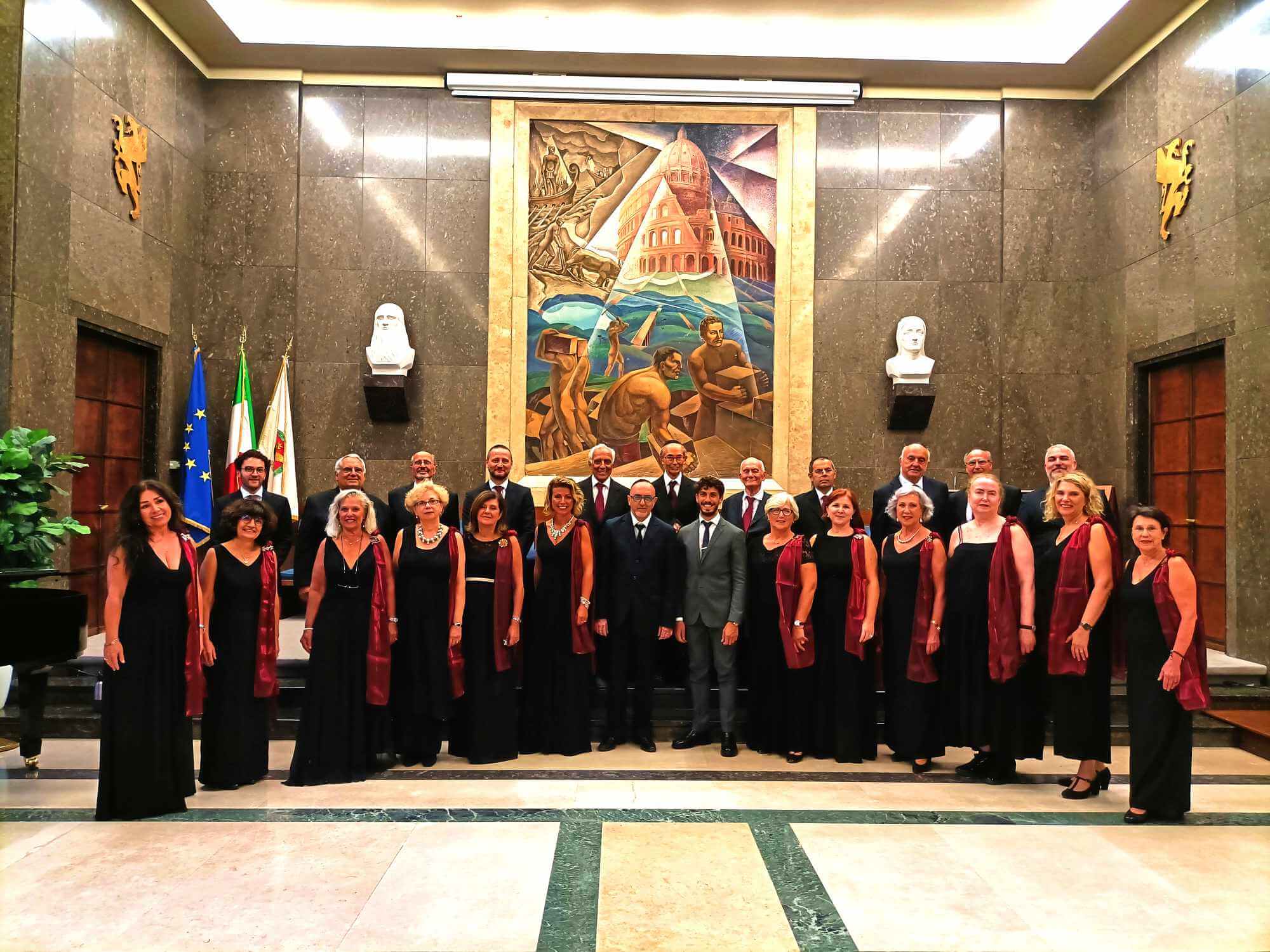
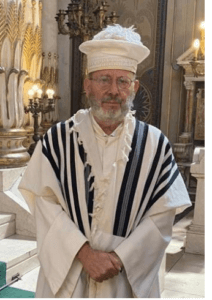 Der Rabbi
Der Rabbi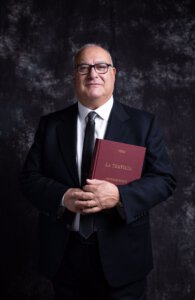 Der Solist
Der Solist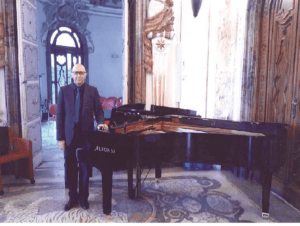 Der Pianist
Der Pianist